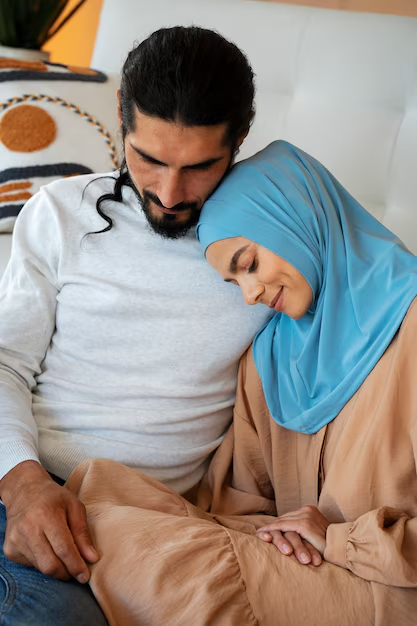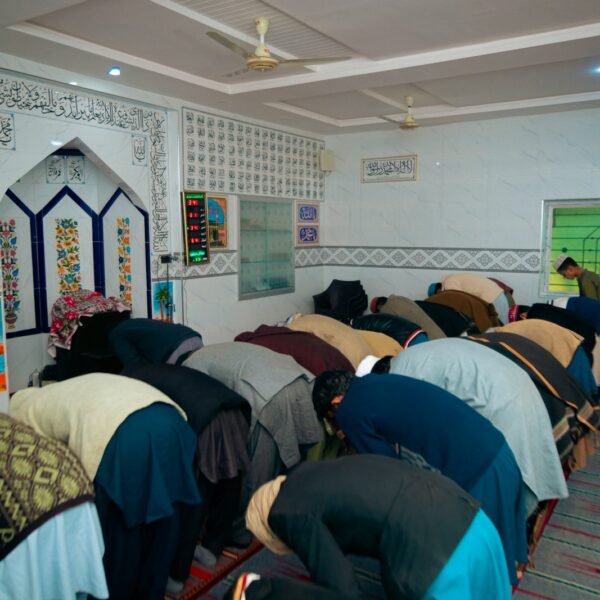As Ramadan comes closer, many couples ask: Is it okay to have sex while fasting? Can You Have Sex During Ramadan? This question mixes thoughts on sexuality and spirituality, making us seek clear answers on Muslim sexual relations during Ramadan.
During Ramadan, Muslims fast from dawn till sunset. This time is filled with deep devotion and self-control. Yet, the topic of intimacy in Ramadan is often skipped. It’s important for married couples to know the rules about sex during Ramadan to respect their relationship and Islamic teachings.
The Importance of Ramadan in Islam
Ramadan is a sacred month for Muslims worldwide. It’s a time for spiritual growth and deepening faith. People focus on fasting, prayer, and reflection.
These practices help build self-discipline and empathy. It’s a period of self-reflection and connecting with God.
During Ramadan, Muslims do charitable acts. This strengthens community bonds and shows compassion and generosity. The month’s practices improve spiritual awareness, changing lives deeply.
Adherents find that the discipline of Ramadan makes their faith stronger. It also brings unity and a sense of belonging to the community.
Ramadan is more than just fasting. It’s a time for deep spiritual growth that affects every part of a believer’s life. The shared rituals during this month lay a foundation for personal and communal growth.

Understanding Fasting in Ramadan
Fasting in Ramadan is a key part of the Islamic faith. Fasting rules in Ramadan mean all adult Muslims must not eat or drink from dawn to sunset. This helps people focus on thinking deeply and being disciplined.
But Ramadan fasting is more than just not eating or drinking. It’s a way to improve self-control and feel for others who have less. It’s also a time to connect more with your faith and clean your soul.
Some people can’t fast because they are sick, pregnant, or traveling. They might not have to fast, but they still try to follow the spirit of Ramadan. This way, fasting stays meaningful for everyone, not just about physical challenges.
Can You Have Sex During Ramadan
For Muslim couples, knowing the rules about sex during Ramadan is key. Islamic teachings give clear rules for intimacy, based on the Quran and Hadith about Ramadan. These rules help couples know when it’s okay to be intimate, keeping the spiritual focus of Ramadan.
Guidelines from the Quran
The Quran talks about sex during Ramadan. It says it’s okay after the fast ends at sunset. This rule helps couples focus on their spiritual journey during the day. They can then connect physically after the fast is over.
Hadith Teachings on Intimacy
Hadith also supports the Quran’s rules. It stresses the importance of not breaking the fast during the day. Sex is only allowed after sunset. Breaking this rule is seen as a big mistake, needing special prayers to fix it. Following these teachings helps couples understand the balance between their spiritual and physical lives during Ramadan.
Prohibited Actions During Fasting Hours
In the holy month of Ramadan, certain rules guide our daily actions. These rules help keep the fasting period sacred. They teach us discipline and self-control.
Understanding the Daytime Restrictions
During Ramadan, we can’t eat, drink, or have sex from dawn till sunset. These rules come from Islamic teachings. They remind us to be pious during this special time. If we break these rules, our fast won’t count, which is a big deal for our spiritual path.
Consequences of Breaking Fast
If we break the fast on purpose, we face big consequences. The Hadith says we might have to fast for 60 days or feed 60 poor people. This shows how important it is to stay true to the fasting rules in Ramadan. It helps us grow personally and helps our community too.
Permissible Sexual Relations After Sunset
After the fast ends at sunset, couples can get closer through intimacy in Ramadan. This time helps couples reconnect and deepen their emotional ties. It follows the Quran’s guidance on nighttime relations.
This period is very important. It makes couples feel closer while following spiritual rules.
Quranic Verses Supporting Nighttime Intimacy
The Quran says it’s okay to be intimate at night. It highlights the value of staying connected during Ramadan. In chapter Al-Baqarah, verse 187, it tells us that husbands and wives can be together during this time.
This shows that being physically close is not just allowed. It’s also seen as a way to keep a strong marriage.
Marital Duties and Emotional Connection
Being intimate after sunset in Ramadan meets marital duties and builds emotional ties. It lets couples show their love and commitment. This strengthens their relationship.
Such moments are key to making both partners feel emotionally and spiritually full during Ramadan.
Limits of Intimacy While Fasting
During Ramadan, the idea of intimacy limits fasting is key. It shapes how couples show love. While sex is off-limits during the day, hugging, kissing, and deep talks are okay. These acts help keep couples close while honoring relationship boundaries Ramadan sets.
It’s vital for partners to be mindful of their actions. Doing things that could lead to arousal or orgasm breaks the fast. So, couples must find a way to show love without breaking their spiritual promise.
You may also be interested in:
Prohibition During Itikaf
Itikaf is a deep spiritual retreat for Muslims in the last ten days of Ramadan. It lets people focus on worship, reflection, and prayer in a mosque. By following Itikaf rules, they leave worldly worries behind and focus on their bond with Allah.
Understanding the Concept of Itikaf
Itikaf means a deep commitment to spiritual growth in Ramadan. Sexual relations during Itikaf are not allowed. This rule helps people control themselves and focus more on prayer and reading the Quran.
Spiritual Focus Over Physical Intimacy
Itikaf is about making a sacred promise to oneself. It helps people avoid distractions and grow spiritually. They should use this time only for worship, making their devotion in Ramadan deep and real. For more info on Itikaf rules, check out trusted sources.
Intimacy and Control During Daytime Fasting
During Ramadan, it’s key to keep control over how close you get with your partner. Small acts of love, like hugs or kisses, are okay. But, it’s important to avoid anything that could make you break your fast.
Acceptable Forms of Affection
It’s okay for spouses to be a little romantic during Ramadan. Simple things like holding hands or a quick kiss are fine. These small gestures can make your bond stronger while keeping the fast intact.
The Risks of Losing Control
Being close during Ramadan can be risky. Couples need to watch out not to let things get too intense. If you’re too close, you might feel tempted to do something that breaks the fast. Being careful and mindful can help you stay on track.
Women’s Health and Intimacy in Ramadan
Women’s health during Ramadan is crucial, especially when it comes to fasting, menstruation, and intimacy. Women on their period don’t fast and can’t have sex during Ramadan. This rule is key for keeping their faith and respect in their relationships.
Menstruation affects many health areas and must be balanced with faith. Women may feel bad physically and emotionally. It’s important to be careful and understanding about intimacy. Talking openly with partners is key to handling these challenges.
Being respectful and loving during Ramadan can make relationships stronger. Partners should understand how fasting and menstruation affect women’s health. They should find ways to show love that is caring and supportive. This openness builds trust, making sure spiritual and physical needs are met during Ramadan.
Balancing Spirituality and Physical Connection
Finding the right balance between spiritual and physical life during Ramadan is key for couples. Fasting helps with self-discipline and spiritual growth. But, the nights of Ramadan are perfect for building a strong bond with your partner. These evenings are great for sharing moments that help keep your marriage strong.
Islamic teachings guide couples on how to be close without losing focus on their spiritual path. It’s important to keep both emotional and physical connections strong. This approach helps couples stay in harmony during Ramadan.
Being open and understanding with each other is crucial for balancing spiritual and physical life. Using faith, couples can create a loving space for spiritual growth and closeness. By focusing on both, couples can make Ramadan a time of deep reflection, love, and unity.
FAQ
Can married couples engage in sexual relations during Ramadan?
What are the rules regarding sexual activity during fasting hours?
Are there any limitations on intimacy while fasting?
What is the significance of Ramadan in Islam?
What are the consequences of breaking the fast intentionally?
Can couples engage in intimate activities while observing I’tikaf?
How does women’s health affect fasting during Ramadan?
How can couples balance spirituality and intimacy during Ramadan?

Embracing Faith, One Insight at a Time!
The teachings of the Quran have always guided my path. With a deep passion for Islamic knowledge, I strive to blend the wisdom of tradition with the relevance of today, making the timeless messages of Islam accessible and meaningful for everyone.
Muslim Culture Hub is my platform to share historical insights and thought-provoking articles, exploring both well-known and lesser-discussed aspects of Islamic culture and beliefs. My mission is to create an inclusive online space where everyone can learn, strengthen their faith, and connect with the profound message of Islam.
Join the journey!
May peace be upon you.








